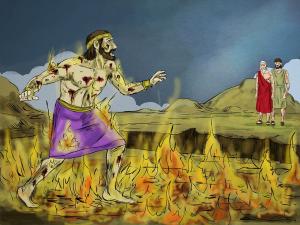
In recent weeks, the Rich Man and Lazarus has become something of a ‘capture the flag’ Bible passage, with some insisting Jesus presented it as a real exchange, thereby proving he believed in eternal conscious torment (Hell). Others, who don’t believe in eternal conscious torment, prefer to see it as a parable, containing only symbolism and metaphor.
Personally, I’m fine either way. Even if understood as a real event rather than a parable, the story doesn’t support a belief in eternal conscious torment. Rather, it comfortably aligns with the narrative of universal salvation. Luke 16:19-31,
“There was a rich man who was dressed in purple and fine linen and lived in luxury every day. At his gate was laid a beggar named Lazarus, covered with sores and longing to eat what fell from the rich man’s table. Even the dogs came and licked his sores.
“The time came when the beggar died and the angels carried him to Abraham’s side. The rich man also died and was buried. In Hades, where he was in torment, he looked up and saw Abraham far away, with Lazarus by his side. So he called to him, ‘Father Abraham, have pity on me and send Lazarus to dip the tip of his finger in water and cool my tongue, because I am in agony in this fire.’
“But Abraham replied, ‘Son, remember that in your lifetime you received your good things, while Lazarus received bad things, but now he is comforted here and you are in agony. And besides all this, between us and you a great chasm has been set in place, so that those who want to go from here to you cannot, nor can anyone cross over from there to us.’
“He answered, ‘Then I beg you, father, send Lazarus to my family, for I have five brothers. Let him warn them, so that they will not also come to this place of torment.’
“Abraham replied, ‘They have Moses and the Prophets; let them listen to them.’
“‘No, father Abraham,’ he said, ‘but if someone from the dead goes to them, they will repent.’
“He said to him, ‘If they do not listen to Moses and the Prophets, they will not be convinced even if someone rises from the dead.’”
Hades is not Hell
First things first, this is not a picture of Hell, as many modern-day believers understand it. Jesus is speaking of Hades (Strong’s reference G86), which is the New Testament equivalent of Sheol – the Old Testament gathering place of the spirits/personalities of the dead, whether righteous or unrighteous. It is a temporary waiting place, and therefore not eternal conscious torment.
Within Judaism, there were (and are) always different schools of thought, including the Sadducees, who didn’t believe in any kind of afterlife, but many of the Jews in Jesus’ day believed Sheol was a waiting place where all souls went after death, whether righteous or unrighteous. Even secular sources understand this better than many in the Church. Sheol had two halves – paradise for the righteous, where they will be united with their ancestors, and a place of torment for those whose souls are twisted out of shape. The place of torment was understood as a chance for the soul to be purified. When Jesus spoke of Hades, he was speaking as a Jewish prophet to a Jewish audience, who would have understood his teaching in this context.
In the story of the Rich Man and Lazarus, Paradise is referred to as Abraham’s Bosom, which chimes with the many Old Testament references to Hebrews being reunited with their fathers after death. In Genesis 15:15, the Lord said to Abraham,
“Thou shalt go to thy fathers in peace.”
At Abraham’s death, it was written that he “was gathered to his people” (Geneses 25:8). The same was said of Ishmael (Genesis 25:17), of Jacob (Genesis 49:33), and of others. Jacob certainly anticipated going to Sheol when he died, joining his ancestors in paradise. (Gen 37:35, 42:13, 44:29).
The other side of Sheol is a place of torment. Moses declared that when people who “despised Yahweh” died, they descended into Sheol (Numbers 16:30, Deuteronomy 32:22).
In the context of the story/parable of The Rich Man and Lazarus, both are in Sheol, but while one is in paradise, the other is in the place of torment.
Sheol is temporary
It is crucial to understand that Sheol/Hades was believed to be a temporary place. There was no crossing over from one half of Sheol to the other; instead, the souls of the righteous were taken to true, eternal paradise (Gan Eden), while the souls in torment could either be restored and welcomed into paradise, or they could go to Gehenna for punishment. Crucially, even Gehenna was not seen as a place of eternal conscious torment. Within first century Judaism, it was commonly believed that the punishment of Gehenna generally lasted up to 12 months before the soul was restored and ushered into Gan Eden (paradise).
Within Sheol itself, I see no reason to assume that the tormented souls were sent there by God – instead, the state of torment can be seen as a trap of the individual’s making, the natural outcome of their life and choices. In other words, a reflection of the state of their souls. The conversation between the rich man and Abraham is revealing, in this respect. The story tells us that the rich man dressed in royal finery and lived in luxury every day, while at his gates Lazarus begged, covered with sores and longing to eat what fell from the rich man’s table. The implication is that though the rich man could have helped Lazarus and others, he chose to indulge himself each and every day, living a loveless life. He is therefore in a place of great discomfort because he has much to learn. His heart is calloused and cruel, as the story goes on to show.
Sheol was an opportunity to examine oneself and the life you’ve lived, and ultimately be restored. This is akin to the ‘wise fire’ Paul writes of in 1 Corinthians 3:14-15,
‘If what has been built survives, the builder will receive a reward. If it is burned up, the builder will suffer loss but yet will be saved—even though only as one escaping through the flames.’
This passage is speaking of the process of judgement, in which the deeds of all people, including believers, will be tested with fire. If what a person has built survives (because it stems from love and is therefore of everlasting worth), they will be rewarded, but even if all the deeds done in the body are proven to be worthless, and are consumed by fire, the soul will still be saved, ‘as one escaping through the flames’. This too is a picture of universal salvation – in the end, God’s wise fire will deliver even the worst of us from all false versions of ourselves, along with all forms of harm.
In the case of the rich man and Lazarus, the rich man is unrepentant, holding to his calloused view of the world:
‘Father Abraham, have pity on me and send Lazarus to dip the tip of his finger in water and cool my tongue, because I am in agony in this fire.’
He still sees Lazarus as a lesser person, a servant to be sent, even though Lazarus is being rewarded in paradise while he is being tormented. He holds to his prejudices, his arrogance, and his pride, failing to recognise his own sorry state. For me, this represents the stubbornness of the benighted soul. When people ask me how long the process of final judgement will take, I rely on Peter’s words on the issue (2 Peter 3:8-9):
But do not forget this one thing, dear friends: With the Lord a day is like a thousand years, and a thousand years are like a day. The Lord is not slow in keeping his promise, as some understand slowness. Instead he is patient with you, not wanting anyone to perish, but everyone to come to repentance.
The Lord is patient with us, not wanting a single soul to perish, but for all to come to repentance – this is the ultimate goal of the Gospel and the express will of God. For the most stubborn among us, as demonstrated by the rich man in this story, a day can be like a thousand years. The fires of judgement will endure for the length of time it takes us to relinquish our self-justification and be reconciled to love. Based on the rich man’s unchanged attitude, I’d say he still had a long way to go.
Jesus has authority over Hades
After sacrificing himself on the cross, Jesus descended into Hades. 1 Peter 3, 18-20:
‘For Christ also suffered once for sins, the righteous for the unrighteous, to bring you to God. He was put to death in the body but made alive in the Spirit. After being made alive, he went and made proclamation to the imprisoned spirits – to those who were disobedient long ago when God waited patiently in the days of Noah while the ark was being built.’
After being made alive in the Spirit (but before his resurrection), he went to preach in Hades, where those who were disobedient in Noah’s time were waiting. After establishing victory through his work on the cross, the first thing Jesus did was to preach liberty to those rebellious souls.
Ephesians 4: 8-10 completes the story:
‘Therefore He says:
“When He ascended on high,
He led captivity captive,
And gave gifts to men.”
(Now this, “He ascended”—what does it mean but that He also first descended into the lower parts of the earth? He who descended is also the One who ascended far above all the heavens, that He might fill all things.)’
All the information we need to join the dots is here – ‘when he ascended on high’ can only refer to Christ’s resurrection from the dead and/or his ascension. The verses in parentheses make this clear – (‘Now this, “he ascended” – what does it mean but that He also first descended into the lower parts of the earth? He who descended is also the One who ascended far above all the heavens, that He might fill all things.’)
Before ascending, Christ first descended into Hades, referred to colloquially as ‘the lower parts of the Earth’ (a common name for Hades in the Old Testament). This same One, who descended to Hades and led captives out of captivity, then ascended far above all the heavens, that He might fill all things. Who else is the One who ascends to fill all things but Jesus, the Name Above All Names?
These two passages refer to the same glorious events – the descent of Christ into Hades, the preaching of the Gospel to those who’d passed away in rebellion, and the liberation of those captives in his ascent. This can only mean that they were offered and accepted grace.
Parable or Story?
Whether the story of the rich man and Lazarus is understood as a parable or a story, it aligns with the Gospel of grace, especially when read in light of the other scriptures quoted here. Human hearts will not automatically see and know everything in the afterlife – we will carry on from where we left off at death, and for those whose hearts are hardened against love, the process of reconciliation to God and others will continue. It might take a long time for a heart to truly abandon its false identities and embrace grace, but the combined destiny of all people is freedom and unity in Christ. In the end, the Lord will woo us all.
Ephesians 1:10,
With all wisdom and understanding, he made known to us the mystery of his will according to his good pleasure, which he purposed in Christ, to be put into effect when the times reach their fulfilment—to bring unity to all things in heaven and on earth under Christ.
*Disclaimer: None of this is an exact science. There is no single, unified teaching on Hell accepted by Jewish teachers in Jesus’ day or in modern times. That said, we would do well to understand the various schools of thought in detail rather than lazily impose the reformist notion of eternal conscious torment on passages that talk about Sheol/Hades, or even Gehenna. I remain utterly convinced that the Hell I’ve heard spoken of in church does not exist. As well as being unbiblical, it would be a profound injustice and an offence to the loving heart of God. To dig more deeply into the topic of Hell, I highly recommend Richard Murray’s outstandingly detailed article, Four Reasons the Early Church Did Not Believe “Hell” Lasts Forever.
If you found this helpful, sign up to my newsletter by clicking the button on the right-hand side of the page.













